Deck 7: Absorption, Variable and Throughput Costing
Question
Question
Question
Question
Question
Question
Question
Question
Question
Question
Question
Question
Question
Question
Question
Question
Question
Question
Question
Question
Question
Question
Question
Question
Question
Question
Question
Question
Question
Question
Question
Question
Question
Question
Question
Question
Question
Question
Question
Question
Question
Question
Question
Question
Question
Question
Question
Question
Question
Question
Question
Question
Question
Question
Question
Question
Question
Question
Question
Question
Question
Question
Question
Question
Question
Question
Question
Question
Question
Question
Question
Question
Question
Question
Question
Question
Question
Question
Question
Question

Unlock Deck
Sign up to unlock the cards in this deck!
Unlock Deck
Unlock Deck
1/102
Play
Full screen (f)
Deck 7: Absorption, Variable and Throughput Costing
1
When units produced are equal to units sold, operating profit under absorption costing will equal operating profit under variable costing.
True
2
Absorption costing income statements typically include "gross margin" as a line item.
True
3
Absorption costing systems subtract inventoried costs from revenues at the time of production.
False
4
Normal capacity and budgeted capacity are demand-based capacity measurements.

Unlock Deck
Unlock for access to all 102 flashcards in this deck.
Unlock Deck
k this deck
5
The Australian Tax office requires managers to use practical capacity for tax reporting because it is more stable over time and therefore less easy to manipulate.

Unlock Deck
Unlock for access to all 102 flashcards in this deck.
Unlock Deck
k this deck
6
In absorption costing systems, costs on the income statement are classified by their behavior.

Unlock Deck
Unlock for access to all 102 flashcards in this deck.
Unlock Deck
k this deck
7
Variable costing does not conform to GAAP because it does not match manufacturing costs with revenues.

Unlock Deck
Unlock for access to all 102 flashcards in this deck.
Unlock Deck
k this deck
8
Theoretical capacity is a supply-based capacity measurement.

Unlock Deck
Unlock for access to all 102 flashcards in this deck.
Unlock Deck
k this deck
9
Budgeted capacity is always greater than normal capacity.

Unlock Deck
Unlock for access to all 102 flashcards in this deck.
Unlock Deck
k this deck
10
In a throughput costing income statement, the throughput contribution is calculated as revenues - direct materials costs.

Unlock Deck
Unlock for access to all 102 flashcards in this deck.
Unlock Deck
k this deck
11
Throughput costing was an outgrowth of the Theory of Constraints.

Unlock Deck
Unlock for access to all 102 flashcards in this deck.
Unlock Deck
k this deck
12
Throughput costing is a modified form of absorption costing that treats direct labor and variable overhead as period expenses.

Unlock Deck
Unlock for access to all 102 flashcards in this deck.
Unlock Deck
k this deck
13
Variable costing income statements include fixed manufacturing overhead as part of the costs of ending inventory.

Unlock Deck
Unlock for access to all 102 flashcards in this deck.
Unlock Deck
k this deck
14
Variable costing data can often be used for making non-routine operating decisions.

Unlock Deck
Unlock for access to all 102 flashcards in this deck.
Unlock Deck
k this deck
15
Synonyms for variable costing include direct costing and marginal costing.

Unlock Deck
Unlock for access to all 102 flashcards in this deck.
Unlock Deck
k this deck
16
Practical capacity is always less than theoretical capacity.

Unlock Deck
Unlock for access to all 102 flashcards in this deck.
Unlock Deck
k this deck
17
Theoretical capacity and practical capacity are demand-based capacity measurements.

Unlock Deck
Unlock for access to all 102 flashcards in this deck.
Unlock Deck
k this deck
18
Absorption costing statements conform to generally accepted accounting principles.

Unlock Deck
Unlock for access to all 102 flashcards in this deck.
Unlock Deck
k this deck
19
On a variable costing income statement, costs are grouped according to their behavior.

Unlock Deck
Unlock for access to all 102 flashcards in this deck.
Unlock Deck
k this deck
20
"Cost" and "expense" are two terms for describing the same concept.

Unlock Deck
Unlock for access to all 102 flashcards in this deck.
Unlock Deck
k this deck
21
Improved information technology has increased the availability of variable costing and throughput costing income statements.

Unlock Deck
Unlock for access to all 102 flashcards in this deck.
Unlock Deck
k this deck
22
Shipp Ltd. budgets the following costs for a normal monthly volume of 500 units selling for $4,000 each.  The product cost per unit using absorption costing is
The product cost per unit using absorption costing is
A) $1,600
B) $2,800
C) $2,000
D) $2,400
 The product cost per unit using absorption costing is
The product cost per unit using absorption costing isA) $1,600
B) $2,800
C) $2,000
D) $2,400

Unlock Deck
Unlock for access to all 102 flashcards in this deck.
Unlock Deck
k this deck
23
Because absorption costing capitalises fixed manufacturing overhead costs to inventory, managers using it may build up inventories unnecessarily.

Unlock Deck
Unlock for access to all 102 flashcards in this deck.
Unlock Deck
k this deck
24
Bella Ltd has operated for 2 years. During that time it produced 1,000 units in year 1 and 800 in year 2, while sales were 800 units in year 1 and 900 in year 2. Variable production costs were $8 per unit during both years. The company uses last-in, first-out (LIFO) for inventory costing. The absorption costing income statements for these 2 years were: Ending inventory for year 2 using variable costing would be
A) $2,200
B) $1,100
C) $1,175
D) $800
A) $2,200
B) $1,100
C) $1,175
D) $800

Unlock Deck
Unlock for access to all 102 flashcards in this deck.
Unlock Deck
k this deck
25
Throughput costing income statements help managers determine the most efficient uses of resources in the short term.

Unlock Deck
Unlock for access to all 102 flashcards in this deck.
Unlock Deck
k this deck
26
Shipp Ltd. budgets the following costs for a normal monthly volume of 500 units selling for $4,000 each. The profit (loss) using variable costing when 500 units are produced and 400 units are sold is
A) $840,000 loss
B) $160,000 profit
C) $480,000 profit
D) $720,000 loss
A) $840,000 loss
B) $160,000 profit
C) $480,000 profit
D) $720,000 loss

Unlock Deck
Unlock for access to all 102 flashcards in this deck.
Unlock Deck
k this deck
27
Shipp Ltd. budgets the following costs for a normal monthly volume of 500 units selling for $4,000 each. The profit (loss) using absorption costing when 500 units are produced and 400 units are sold is
A) $840,000 loss
B) $160,000 profit
C) $480,000 profit
D) $720,000 loss
A) $840,000 loss
B) $160,000 profit
C) $480,000 profit
D) $720,000 loss

Unlock Deck
Unlock for access to all 102 flashcards in this deck.
Unlock Deck
k this deck
28
Exeter Ltd. introduced a new mass-produced specialty product early in the year. Production and sales of this product for the first four months are as follows: The firm's budgeted fixed overhead is $200,000, and budgeted output is 1,000 units per month. The volume variance, if any, is carried forward month-by-month and closed at the end of the year. When 1,000 units are produced and sold, expected monthly operating profit is $40,000.
In which month(s) was variable costing profit lower than absorption costing profit?
A) 4
B) 1, 2, and 3
C) 2 and 3
D) 3 and 4
In which month(s) was variable costing profit lower than absorption costing profit?
A) 4
B) 1, 2, and 3
C) 2 and 3
D) 3 and 4

Unlock Deck
Unlock for access to all 102 flashcards in this deck.
Unlock Deck
k this deck
29
Exeter Ltd. introduced a new mass-produced specialty product early in the year. Production and sales of this product for the first four months are as follows: The firm's budgeted fixed overhead is $200,000, and budgeted output is 1,000 units per month. The volume variance, if any, is carried forward month-by-month and closed at the end of the year. When 1,000 units are produced and sold, expected monthly operating profit is $40,000.
Compared to using absorption costing, using variable costing will result in operating profit for the 4-month period to be
A) Higher
B) Lower
C) Same
D) Cannot be determined
Compared to using absorption costing, using variable costing will result in operating profit for the 4-month period to be
A) Higher
B) Lower
C) Same
D) Cannot be determined

Unlock Deck
Unlock for access to all 102 flashcards in this deck.
Unlock Deck
k this deck
30
Throughput costing income statements cannot be used to evaluate management performance.

Unlock Deck
Unlock for access to all 102 flashcards in this deck.
Unlock Deck
k this deck
31
Bella Ltd has operated for 2 years. During that time it produced 1,000 units in year 1 and 800 in year 2, while sales were 800 units in year 1 and 900 in year 2. Variable production costs were $8 per unit during both years. The company uses last-in, first-out (LIFO) for inventory costing. The absorption costing income statements for these 2 years were: Operating profit for year 1 using variable costing would be
A) $1,600
B) $(2,800)
C) $2,200
D) $400
A) $1,600
B) $(2,800)
C) $2,200
D) $400

Unlock Deck
Unlock for access to all 102 flashcards in this deck.
Unlock Deck
k this deck
32
Exeter Ltd. introduced a new mass-produced specialty product early in the year. Production and sales of this product for the first four months are as follows: 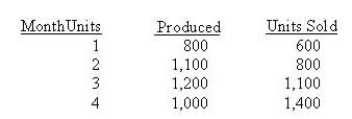 The firm's budgeted fixed overhead is $200,000, and budgeted output is 1,000 units per month. The volume variance, if any, is carried forward month-by-month and closed at the end of the year. When 1,000 units are produced and sold, expected monthly operating profit is $40,000. In which month(s) was variable costing profit higher than absorption costing profit?
The firm's budgeted fixed overhead is $200,000, and budgeted output is 1,000 units per month. The volume variance, if any, is carried forward month-by-month and closed at the end of the year. When 1,000 units are produced and sold, expected monthly operating profit is $40,000. In which month(s) was variable costing profit higher than absorption costing profit?
A) 4
B) l, 2, and 3
C) 2 and 3
D) 3 and 4
 The firm's budgeted fixed overhead is $200,000, and budgeted output is 1,000 units per month. The volume variance, if any, is carried forward month-by-month and closed at the end of the year. When 1,000 units are produced and sold, expected monthly operating profit is $40,000. In which month(s) was variable costing profit higher than absorption costing profit?
The firm's budgeted fixed overhead is $200,000, and budgeted output is 1,000 units per month. The volume variance, if any, is carried forward month-by-month and closed at the end of the year. When 1,000 units are produced and sold, expected monthly operating profit is $40,000. In which month(s) was variable costing profit higher than absorption costing profit?A) 4
B) l, 2, and 3
C) 2 and 3
D) 3 and 4

Unlock Deck
Unlock for access to all 102 flashcards in this deck.
Unlock Deck
k this deck
33
Fixed overhead costs are treated differently under variable costing and throughput costing.

Unlock Deck
Unlock for access to all 102 flashcards in this deck.
Unlock Deck
k this deck
34
JIT systems are incompatible with absorption costing systems.

Unlock Deck
Unlock for access to all 102 flashcards in this deck.
Unlock Deck
k this deck
35
Throughput costing assumes that product costs other than materials tend to be fixed in the short run.

Unlock Deck
Unlock for access to all 102 flashcards in this deck.
Unlock Deck
k this deck
36
Direct materials costs are treated similarly under variable costing and throughput costing.

Unlock Deck
Unlock for access to all 102 flashcards in this deck.
Unlock Deck
k this deck
37
Taylor Ltd just finished its second year of operations. In the first year it produced 1,000 units and sold 400. The second year resulted in the same production level, but sales were 1,200 units. The variable costing income statements for both years are shown below:  The product cost per unit during year 1 using absorption would be
The product cost per unit during year 1 using absorption would be
A) $67,000
B) $73,000
C) $82,000
D) $85,000
 The product cost per unit during year 1 using absorption would be
The product cost per unit during year 1 using absorption would beA) $67,000
B) $73,000
C) $82,000
D) $85,000

Unlock Deck
Unlock for access to all 102 flashcards in this deck.
Unlock Deck
k this deck
38
Bella Ltd has operated for 2 years. During that time it produced 1,000 units in year 1 and 800 in year 2, while sales were 800 units in year 1 and 900 in year 2. Variable production costs were $8 per unit during both years. The company uses last-in, first-out (LIFO) for inventory costing. The absorption costing income statements for these 2 years were: 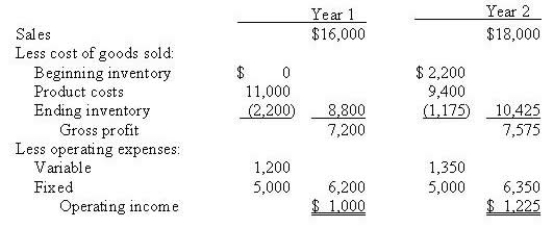 Cost of goods sold for year 1 using variable costing would be
Cost of goods sold for year 1 using variable costing would be
A) $6,400
B) $8,800
C) $8,000
D) $7,600
 Cost of goods sold for year 1 using variable costing would be
Cost of goods sold for year 1 using variable costing would beA) $6,400
B) $8,800
C) $8,000
D) $7,600

Unlock Deck
Unlock for access to all 102 flashcards in this deck.
Unlock Deck
k this deck
39
Shipp Ltd. budgets the following costs for a normal monthly volume of 500 units selling for $4,000 each. The product cost per unit using variable costing is
A) $1,600
B) $2,800
C) $2,000
D) $2,400
A) $1,600
B) $2,800
C) $2,000
D) $2,400

Unlock Deck
Unlock for access to all 102 flashcards in this deck.
Unlock Deck
k this deck
40
Bella Ltd has operated for 2 years. During that time it produced 1,000 units in year 1 and 800 in year 2, while sales were 800 units in year 1 and 900 in year 2. Variable production costs were $8 per unit during both years. The company uses last-in, first-out (LIFO) for inventory costing. The absorption costing income statements for these 2 years were: Operating profit for year 2 using variable costing would be
A) $1,000
B) $1,600
C) $4,000
D) $1,450
A) $1,000
B) $1,600
C) $4,000
D) $1,450

Unlock Deck
Unlock for access to all 102 flashcards in this deck.
Unlock Deck
k this deck
41
Taylor Ltd just finished its second year of operations. In the first year it produced 1,000 units and sold 400. The second year resulted in the same production level, but sales were 1,200 units. The variable costing income statements for both years are shown below: The operating profit for year 2 using absorption costing would be
A) $(9,800)
B) $600
C) $(9,000)
D) $6,000
A) $(9,800)
B) $600
C) $(9,000)
D) $6,000

Unlock Deck
Unlock for access to all 102 flashcards in this deck.
Unlock Deck
k this deck
42
During its first year of operations, Kima Ltd. experienced the following: If Kima calculates operating profit under the variable costing method as opposed to the absorption costing method, operating profit will be
A) $45,000 lower
B) $270,000 lower
C) $315,000 higher
D) $270,000 higher
A) $45,000 lower
B) $270,000 lower
C) $315,000 higher
D) $270,000 higher

Unlock Deck
Unlock for access to all 102 flashcards in this deck.
Unlock Deck
k this deck
43
Under which costing method(s) are administrative and selling costs considered period expenses? I Absorption costing
II Throughput costing
III Variable costing
A) I and II only
B) II and III only
C) I and III only
D) I, II, and III
II Throughput costing
III Variable costing
A) I and II only
B) II and III only
C) I and III only
D) I, II, and III

Unlock Deck
Unlock for access to all 102 flashcards in this deck.
Unlock Deck
k this deck
44
Rubble Ltd develops an annual overhead budget at the start of each year (which has remained unchanged for the last 2 years), and closes any over- or underapplied overhead at year-end. For the firm's single product the following ending inventory levels have been experienced during the last 7 months: In how many months would variable costing profit be equal to absorption costing profit?
A) 0
B) 1
C) 2
D) 3
A) 0
B) 1
C) 2
D) 3

Unlock Deck
Unlock for access to all 102 flashcards in this deck.
Unlock Deck
k this deck
45
Rubble Ltd develops an annual overhead budget at the start of each year (which has remained unchanged for the last 2 years), and closes any over- or underapplied overhead at year-end. For the firm's single product the following ending inventory levels have been experienced during the last 7 months: In how many months would variable costing profit be lower than absorption costing profit?
A) 1
B) 2
C) 3
D) 4
A) 1
B) 2
C) 3
D) 4

Unlock Deck
Unlock for access to all 102 flashcards in this deck.
Unlock Deck
k this deck
46
Rubble Ltd develops an annual overhead budget at the start of each year (which has remained unchanged for the last 2 years), and closes any over- or underapplied overhead at year-end. For the firm's single product the following ending inventory levels have been experienced during the last 7 months: 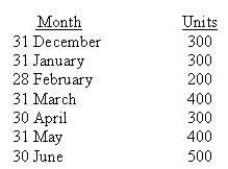 For how many months would variable costing profit be higher than absorption?
For how many months would variable costing profit be higher than absorption?
A) 1
B) 2
C) 3
D) 4
 For how many months would variable costing profit be higher than absorption?
For how many months would variable costing profit be higher than absorption?A) 1
B) 2
C) 3
D) 4

Unlock Deck
Unlock for access to all 102 flashcards in this deck.
Unlock Deck
k this deck
47
The chief executive officer told Nick, the production manager at BRS Ltd, to reduce costs and increase profits. In response, Nick decided to produce more units for inventory. BRS is most likely using
A) Variable costing.
B) Throughput costing.
C) Absorption costing.
D) Capacity-based costing.
A) Variable costing.
B) Throughput costing.
C) Absorption costing.
D) Capacity-based costing.

Unlock Deck
Unlock for access to all 102 flashcards in this deck.
Unlock Deck
k this deck
48
Which costing method matches costs and revenues most appropriately for generally accepted accounting principles?
A) Throughput costing
B) Absorption costing
C) Variable costing
D) Activity-based costing
A) Throughput costing
B) Absorption costing
C) Variable costing
D) Activity-based costing

Unlock Deck
Unlock for access to all 102 flashcards in this deck.
Unlock Deck
k this deck
49
Taylor Ltd just finished its second year of operations. In the first year it produced 1,000 units and sold 400. The second year resulted in the same production level, but sales were 1,200 units. The variable costing income statements for both years are shown below: The ending inventory for year 2 using absorption costing would be
A) $51,000
B) $34,000
C) $22,000
D) $17,000
A) $51,000
B) $34,000
C) $22,000
D) $17,000

Unlock Deck
Unlock for access to all 102 flashcards in this deck.
Unlock Deck
k this deck
50
Variable production overhead is allocated to inventory when using
A) Absorption costing and variable costing
B) Absorption costing and throughput costing
C) Variable costing and throughput costing
D) Absorption costing, variable costing, and throughput costing
A) Absorption costing and variable costing
B) Absorption costing and throughput costing
C) Variable costing and throughput costing
D) Absorption costing, variable costing, and throughput costing

Unlock Deck
Unlock for access to all 102 flashcards in this deck.
Unlock Deck
k this deck
51
During its first year of operations, Kima Ltd. experienced the following: 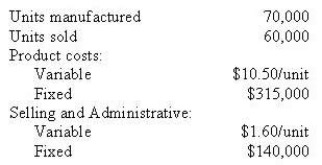 The amount of variable costs deducted from revenues under the variable costing approach would be
The amount of variable costs deducted from revenues under the variable costing approach would be
A) $847,000
B) $831,000
C) $726,000
D) $742,000
 The amount of variable costs deducted from revenues under the variable costing approach would be
The amount of variable costs deducted from revenues under the variable costing approach would beA) $847,000
B) $831,000
C) $726,000
D) $742,000

Unlock Deck
Unlock for access to all 102 flashcards in this deck.
Unlock Deck
k this deck
52
Variable costing profit for the period 1st July through 30th September was $400. Inventory data are as follows:  What is the profit if absorption costing is used?
What is the profit if absorption costing is used?
A) $300
B) $500
C) $400
D) $600
 What is the profit if absorption costing is used?
What is the profit if absorption costing is used?A) $300
B) $500
C) $400
D) $600

Unlock Deck
Unlock for access to all 102 flashcards in this deck.
Unlock Deck
k this deck
53
During its first year of operations, Kima Ltd. experienced the following: The cost of goods sold under absorption costing would be
A) $585,000
B) $735,000
C) $945,000
D) $900,000
A) $585,000
B) $735,000
C) $945,000
D) $900,000

Unlock Deck
Unlock for access to all 102 flashcards in this deck.
Unlock Deck
k this deck
54
Direct materials costs are deducted from revenues when units are sold under which of the following costing method(s)? I Absorption
II Throughput
III Variable
A) I and II only
B) II and III only
C) I and III only
D) I, II, and III
II Throughput
III Variable
A) I and II only
B) II and III only
C) I and III only
D) I, II, and III

Unlock Deck
Unlock for access to all 102 flashcards in this deck.
Unlock Deck
k this deck
55
Any costs traced or allocated to inventory are expensed when units are sold in which of the following costing method(s)? I Absorption
II Throughput
III Variable
A) I and II only
B) II and III only
C) I and III only
D) I, II, and III
II Throughput
III Variable
A) I and II only
B) II and III only
C) I and III only
D) I, II, and III

Unlock Deck
Unlock for access to all 102 flashcards in this deck.
Unlock Deck
k this deck
56
General Ltd. budgeted fixed overhead costs of $25,000 per quarter and 1,000 units per quarter in its normal absorption costing system. Any volume variance is carried forward and closed at year end. The company experienced the following activity: 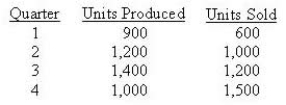 The volume variance was favorable in quarter(s)?
The volume variance was favorable in quarter(s)?
A) 2, 3, and 4
B) 2 and 3
C) 3 and 4
D) 3
 The volume variance was favorable in quarter(s)?
The volume variance was favorable in quarter(s)?A) 2, 3, and 4
B) 2 and 3
C) 3 and 4
D) 3

Unlock Deck
Unlock for access to all 102 flashcards in this deck.
Unlock Deck
k this deck
57
Total production overhead is treated as a product cost when using
A) Absorption costing
B) Throughput costing
C) Variable costing
D) Throughput costing and absorption costing
A) Absorption costing
B) Throughput costing
C) Variable costing
D) Throughput costing and absorption costing

Unlock Deck
Unlock for access to all 102 flashcards in this deck.
Unlock Deck
k this deck
58
Taylor Ltd just finished its second year of operations. In the first year it produced 1,000 units and sold 400. The second year resulted in the same production level, but sales were 1,200 units. The variable costing income statements for both years are shown below: The operating profit for year 1 using absorption costing would be
A) $6,000
B) $(9,000)
C) $(9,800)
D) $600
A) $6,000
B) $(9,000)
C) $(9,800)
D) $600

Unlock Deck
Unlock for access to all 102 flashcards in this deck.
Unlock Deck
k this deck
59
During its first year of operations, Kima Ltd. experienced the following: The amount of fixed costs deducted from revenues under the absorption costing approach would be
A) $410,000
B) $455,000
C) $390,000
D) $435,000
A) $410,000
B) $455,000
C) $390,000
D) $435,000

Unlock Deck
Unlock for access to all 102 flashcards in this deck.
Unlock Deck
k this deck
60
Philpott's operating profit using absorption costing is $100. Its inventories using both absorption and variable costing are as follows:  Under variable costing, operating profit would be:
Under variable costing, operating profit would be:
A) $102
B) $94
C) $100
D) $96
 Under variable costing, operating profit would be:
Under variable costing, operating profit would be:A) $102
B) $94
C) $100
D) $96

Unlock Deck
Unlock for access to all 102 flashcards in this deck.
Unlock Deck
k this deck
61
In variable costing
A) Only variable production costs are considered product costs
B) All non-variable production costs are treated as product costs
C) Direct costs are considered to be period costs
D) All variable costs are considered product costs
A) Only variable production costs are considered product costs
B) All non-variable production costs are treated as product costs
C) Direct costs are considered to be period costs
D) All variable costs are considered product costs

Unlock Deck
Unlock for access to all 102 flashcards in this deck.
Unlock Deck
k this deck
62
General Ltd. budgeted fixed overhead costs of $25,000 per quarter and 1,000 units per quarter in its normal absorption costing system. Any volume variance is carried forward and closed at year-end. The company experienced the following activity: The volume variance in quarter 1 was
A) $2,500 Unfavorable
B) $10,000 Unfavorable
C) $7,500 Favorable
D) $5,000 Favorable
A) $2,500 Unfavorable
B) $10,000 Unfavorable
C) $7,500 Favorable
D) $5,000 Favorable

Unlock Deck
Unlock for access to all 102 flashcards in this deck.
Unlock Deck
k this deck
63
An estimated fixed overhead allocation rate
A) Is unrealistically large if determined using theoretical capacity
B) Can be considered an estimated cost of capacity per unit
C) Is usually based on theoretical capacity
D) Does not provide information about opportunity costs of unused capacity
A) Is unrealistically large if determined using theoretical capacity
B) Can be considered an estimated cost of capacity per unit
C) Is usually based on theoretical capacity
D) Does not provide information about opportunity costs of unused capacity

Unlock Deck
Unlock for access to all 102 flashcards in this deck.
Unlock Deck
k this deck
64
Under generally accepted accounting principles, absorption costing is used for 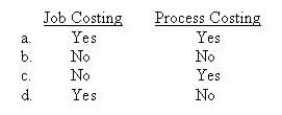
A) Yes/Yes
B) No/No
C) No/Yes
D) Yes/No

A) Yes/Yes
B) No/No
C) No/Yes
D) Yes/No

Unlock Deck
Unlock for access to all 102 flashcards in this deck.
Unlock Deck
k this deck
65
Throughput costing is a modified form of
A) Variable costing
B) Full costing
C) Absorption costing
D) Job costing
A) Variable costing
B) Full costing
C) Absorption costing
D) Job costing

Unlock Deck
Unlock for access to all 102 flashcards in this deck.
Unlock Deck
k this deck
66
The capacity level which assumes continuous, uninterrupted production 365 days per year is called
A) Budgeted capacity
B) Normal capacity
C) Practical capacity
D) Theoretical capacity
A) Budgeted capacity
B) Normal capacity
C) Practical capacity
D) Theoretical capacity

Unlock Deck
Unlock for access to all 102 flashcards in this deck.
Unlock Deck
k this deck
67
When calculating an estimated fixed production cost overhead allocation rate, accountants choose the
A) Allocation base to use as the denominator
B) Allocation base to use as the numerator
C) Allocation base to use as the rate
D) Allocation base that minimises total fixed production overhead
A) Allocation base to use as the denominator
B) Allocation base to use as the numerator
C) Allocation base to use as the rate
D) Allocation base that minimises total fixed production overhead

Unlock Deck
Unlock for access to all 102 flashcards in this deck.
Unlock Deck
k this deck
68
General Ltd. budgeted fixed overhead costs of $25,000 per quarter and 1,000 units per quarter in its normal absorption costing system. Any volume variance is carried forward and closed at year end. The company experienced the following activity: The volume variance for the year was
A) -0-
B) Favorable
C) Unfavorable
D) Cannot be determined
A) -0-
B) Favorable
C) Unfavorable
D) Cannot be determined

Unlock Deck
Unlock for access to all 102 flashcards in this deck.
Unlock Deck
k this deck
69
Absorption costing will produce a larger operating profit than variable costing if
A) Fixed production overhead increases
B) Fixed production overhead decreases
C) Units produced exceed units sold
D) Units sold exceed units produced
A) Fixed production overhead increases
B) Fixed production overhead decreases
C) Units produced exceed units sold
D) Units sold exceed units produced

Unlock Deck
Unlock for access to all 102 flashcards in this deck.
Unlock Deck
k this deck
70
Which of the following types of capacity can result in an unrealistically small fixed overhead allocation rate if used as an allocation base?
A) Normal capacity
B) Theoretical capacity
C) Budgeted capacity
D) Practical capacity
A) Normal capacity
B) Theoretical capacity
C) Budgeted capacity
D) Practical capacity

Unlock Deck
Unlock for access to all 102 flashcards in this deck.
Unlock Deck
k this deck
71
The difference between practical capacity and theoretical capacity is
A) Budgeted fixed costs
B) Expected downtimes
C) Excess capacity
D) Nothing, because the two terms have the same meaning
A) Budgeted fixed costs
B) Expected downtimes
C) Excess capacity
D) Nothing, because the two terms have the same meaning

Unlock Deck
Unlock for access to all 102 flashcards in this deck.
Unlock Deck
k this deck
72
Under the variable costing method, fixed production overhead is
A) Included in inventory
B) Expensed in the period incurred
C) Expensed as a product cost
D) Expensed when the inventory is sold
A) Included in inventory
B) Expensed in the period incurred
C) Expensed as a product cost
D) Expensed when the inventory is sold

Unlock Deck
Unlock for access to all 102 flashcards in this deck.
Unlock Deck
k this deck
73
The volume variance is calculated as
A) Difference between estimated fixed overhead costs and allocated fixed overhead costs
B) Sum of estimated fixed overhead costs and allocated fixed overhead costs
C) Difference between estimated fixed overhead costs and actual fixed overhead costs
D) Difference between actual fixed overhead costs and allocated fixed overhead costs
A) Difference between estimated fixed overhead costs and allocated fixed overhead costs
B) Sum of estimated fixed overhead costs and allocated fixed overhead costs
C) Difference between estimated fixed overhead costs and actual fixed overhead costs
D) Difference between actual fixed overhead costs and allocated fixed overhead costs

Unlock Deck
Unlock for access to all 102 flashcards in this deck.
Unlock Deck
k this deck
74
Absorption costing
A) Is used for external reporting purposes
B) Includes variable and fixed period costs in inventory
C) Is the method in which the fixed overhead cost is not included in inventory
D) Treats production costs as expenses in the period in which they are incurred
A) Is used for external reporting purposes
B) Includes variable and fixed period costs in inventory
C) Is the method in which the fixed overhead cost is not included in inventory
D) Treats production costs as expenses in the period in which they are incurred

Unlock Deck
Unlock for access to all 102 flashcards in this deck.
Unlock Deck
k this deck
75
What type of capacity is the upper capacity limit that takes into account the organisation's regularly scheduled times for production?
A) Tax capacity
B) Practical capacity
C) Scheduled capacity
D) Normal capacity
A) Tax capacity
B) Practical capacity
C) Scheduled capacity
D) Normal capacity

Unlock Deck
Unlock for access to all 102 flashcards in this deck.
Unlock Deck
k this deck
76
Which of the following are demand-based capacity levels? I Normal capacity
II Budgeted capacity
III Practical capacity
A) I and II only
B) II and III only
C) I and III only
D) I, II, and III
II Budgeted capacity
III Practical capacity
A) I and II only
B) II and III only
C) I and III only
D) I, II, and III

Unlock Deck
Unlock for access to all 102 flashcards in this deck.
Unlock Deck
k this deck
77
In throughput costing, direct labor and variable overhead are treated as
A) Measures of capacity
B) Fixed costs
C) Period costs
D) Product costs
A) Measures of capacity
B) Fixed costs
C) Period costs
D) Product costs

Unlock Deck
Unlock for access to all 102 flashcards in this deck.
Unlock Deck
k this deck
78
Practical capacity is estimated based on
A) Engineering studies and labor use patterns
B) The behavior of fixed costs
C) The behavior of variable costs
D) Demand patterns
A) Engineering studies and labor use patterns
B) The behavior of fixed costs
C) The behavior of variable costs
D) Demand patterns

Unlock Deck
Unlock for access to all 102 flashcards in this deck.
Unlock Deck
k this deck
79
Exter Manufacturing experienced the following activity over the last four years. 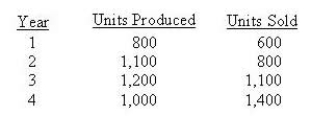 The firm's estimated fixed overhead allocation rate was unchanged over the 4 years at $200 per unit, based on budgeted fixed overhead of $200,000 and 1,000 units of output. The volume variance is closed to the cost of goods sold each year. Exter maintains an absorption costing system. The volume variance for Year 2 is
The firm's estimated fixed overhead allocation rate was unchanged over the 4 years at $200 per unit, based on budgeted fixed overhead of $200,000 and 1,000 units of output. The volume variance is closed to the cost of goods sold each year. Exter maintains an absorption costing system. The volume variance for Year 2 is
A) $40,000 Unfavorable
B) $60,000 Favorable
C) $100,000 Unfavorable
D) $20,000 Favorable
 The firm's estimated fixed overhead allocation rate was unchanged over the 4 years at $200 per unit, based on budgeted fixed overhead of $200,000 and 1,000 units of output. The volume variance is closed to the cost of goods sold each year. Exter maintains an absorption costing system. The volume variance for Year 2 is
The firm's estimated fixed overhead allocation rate was unchanged over the 4 years at $200 per unit, based on budgeted fixed overhead of $200,000 and 1,000 units of output. The volume variance is closed to the cost of goods sold each year. Exter maintains an absorption costing system. The volume variance for Year 2 isA) $40,000 Unfavorable
B) $60,000 Favorable
C) $100,000 Unfavorable
D) $20,000 Favorable

Unlock Deck
Unlock for access to all 102 flashcards in this deck.
Unlock Deck
k this deck
80
Supply-based capacity levels include I Normal capacity
II Practical capacity
III Theoretical capacity
A) I and II only
B) I and III only
C) II and III only
D) I, II, and III
II Practical capacity
III Theoretical capacity
A) I and II only
B) I and III only
C) II and III only
D) I, II, and III

Unlock Deck
Unlock for access to all 102 flashcards in this deck.
Unlock Deck
k this deck



